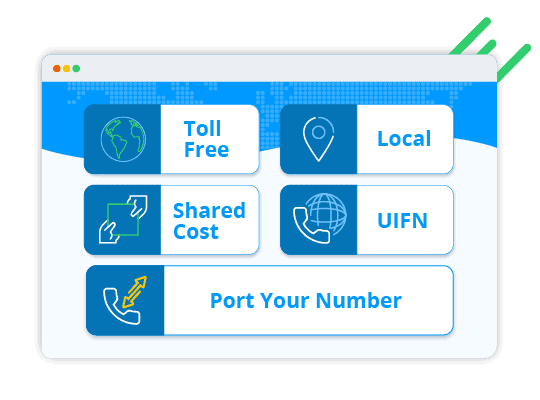Zimbabwe Virtual Phone Numbers
Zimbabwe Virtual Phone Numbers
Zimbabwe virtual numbers allow you to take and make calls from anywhere. Buy a Zimbabwe phone number online and start managing calls in minutes!
Buy Zimbabwe Phone Numbers Online, Risk-Free

Get Reliable Zimbabwe Virtual Numbers for Business Today
Zimbabwe virtual phone numbers, also known as VoIP numbers, are real phone numbers with business features built-in. Manage your numbers from AVOXI's intuitive web-based interface or route our voice services through your existing phone system setup.
Get national and local virtual numbers in Zimbabwe with no setup fees or minimum contracts. Try Zimbabwe VoIP services risk-free today!
Common Questions About Zimbabwe Virtual Numbers
When you purchase a Zimbabwe virtual number in the online shopping cart, your new business number is set up and activated within 30 minutes or less. If your business email does not match your listed company, an AVOXI expert may reach out to confirm your account details before unblocking the number.
To use our services with existing virtual numbers in Zimbabwe, simply transfer your VoIP phone numbers to AVOXI. Porting Zimbabwe virtual telephone numbers is a simple process.
Yes, if you are using an AVOXI number designated as TrueLocal. These numbers are guaranteed to work as your outbound caller ID and can be found listed in our online shopping cart.
Yes! AVOXI SIP trunking is a perfect alternative to Zimbabwe Calling Plans in Teams. Our built-in, Microsoft-approved SBC solution makes configuration in Teams quick and easy.
In addition to the best Zimbabwe virtual phone number services for business, popular solutions from AVOXI include International VoIP Numbers, Virtual Contact Centers, and Global SIP Trunking.
Executive Summary
Establishing a business presence in Zimbabwe presents unique opportunities, particularly through the use of virtual phone numbers. These digital solutions are becoming increasingly critical for companies aiming to expand into emerging markets, offering a cost-effective, scalable, and adaptable approach to communication. By integrating virtual numbers into their market entry strategies, businesses can foster local engagement, enhance customer service, and streamline operations. This guide explores the business value of virtual numbers, industry-specific use cases, common concerns, and offers practical advice for implementation.
Market Overview: Business Landscape & Communication Infrastructure
Zimbabwe's business landscape is characterized by a growing entrepreneurial spirit, particularly in sectors like technology, retail, and professional services. While the country faces economic challenges such as inflation and currency instability, there remains significant potential in both urban and rural markets. With a population of over 16 million, Zimbabwe presents an untapped customer base, especially in its two largest cities, Harare and Bulawayo.
In terms of communication infrastructure, Zimbabwe has made considerable strides. The mobile penetration rate is high, with over 90% of the population having access to mobile services. However, fixed-line infrastructure is less reliable, and businesses often rely on mobile phones for customer interaction. This creates an ideal environment for virtual phone numbers, which provide flexibility, scalability, and cost efficiency in reaching local and international markets.
Virtual Numbers in Market Entry Strategy
Virtual phone numbers are an essential tool for businesses entering the Zimbabwean market. These numbers, which function through cloud-based telephony systems, allow companies to establish a local presence without the need for physical offices or infrastructure. They can be used for customer support, sales inquiries, marketing campaigns, and more.
When incorporated into a broader market entry strategy, virtual numbers serve as a key component of localization efforts. They enable businesses to build trust with local customers by appearing as a Zimbabwean entity, even if operations are managed remotely or from abroad. This not only strengthens brand presence but also helps businesses adhere to local communication expectations, ensuring accessibility and responsiveness.
Industry-Specific Applications
- Technology For tech companies looking to offer SaaS products, virtual numbers facilitate customer support and sales inquiries in Zimbabwe. They can use these numbers for both local calls and international communications, providing seamless customer experiences. For example, a cloud-based software provider might set up a Zimbabwean virtual number for customer service and technical support, ensuring that Zimbabwean users have easy access to assistance in their time zone and native language.
- Retail Retail businesses, especially those in e-commerce, can benefit greatly from virtual numbers. Virtual numbers help companies establish localized sales lines, enhancing customer trust in their purchasing experience. A Zimbabwe-based e-commerce store, for instance, can offer a local number for customers to call for inquiries, refunds, or product information, ensuring that customer interaction feels personal and accessible. Virtual numbers also support SMS marketing campaigns, a popular communication method in Zimbabwe.
- Professional Services For consulting or legal services, virtual numbers offer a professional and cost-effective solution. They allow service providers to maintain a local presence while working remotely. For example, a law firm providing services in Harare can use a virtual number to facilitate consultations or appointment scheduling, ensuring that prospective clients view the business as locally accessible.
Addressing Common Concerns
1. Cost Efficiency Virtual numbers offer a significant reduction in overhead costs. Businesses do not need to invest in physical offices or telecom infrastructure. Additionally, virtual numbers typically provide pay-per-use or subscription pricing models, which means businesses can scale up or down as needed, making them ideal for fluctuating demand.
2. Local Presence Perception Some businesses may worry that a virtual number may not offer the same legitimacy as a physical phone line. However, virtual numbers can be configured to appear as local as traditional landlines, which helps dispel concerns. Furthermore, virtual numbers often offer features such as voicemail, call forwarding, and time-zone management to provide a fully localized experience.
3. Technical Reliability With reliable internet infrastructure in Zimbabwe’s urban centers, the risk of technical failures is minimal. Cloud-based telephony systems typically offer excellent uptime and redundancy features. Choosing a reputable provider can mitigate concerns about reliability.
Implementation Guide: Preparation, Launch, and Operations
1. Preparation
- Market Research: Understand local preferences for communication. Zimbabweans prefer mobile communication, so optimizing for mobile-first solutions is essential.
- Regulatory Compliance: Verify that your virtual number provider complies with local telecommunications regulations. Ensure adherence to data privacy laws and telecom licensing.
- Vendor Selection: Choose a reliable virtual number provider that offers international and local number options, supports multiple communication channels (SMS, voice), and has strong customer support.
2. Launch
- Setup: Choose the appropriate type of virtual number—whether a toll-free, local, or geographic number—based on your business goals.
- Integration: Integrate the virtual number with your existing communication systems (CRM, customer service platforms). Ensure smooth handoff between various communication channels, like phone calls, SMS, and email.
- Testing: Before fully launching, test the virtual number to ensure that calls are routed correctly, messages are delivered, and there are no technical glitches.
3. Operations
- Customer Support: Assign local or international teams to manage communications, based on the volume and complexity of inquiries. Use time-zone management features to ensure availability during business hours in Zimbabwe.
- Tracking and Analytics: Leverage the analytics tools provided by the virtual number service to track call volume, duration, and customer inquiries. This data is invaluable for improving services and optimizing marketing campaigns.
- Scalability: Monitor performance regularly, adjusting your number portfolio as needed. Add more virtual numbers during peak seasons or for special marketing campaigns.
Best Practices
- Localization: Ensure that your virtual number communications reflect local language and customs. Employ local staff or customer service teams who understand the cultural nuances.
- Multi-Channel Approach: Integrate virtual numbers with other digital communication methods (email, social media, live chat) to provide a comprehensive customer experience.
- Customer Data Privacy: Be mindful of local data protection regulations. Always ensure that customer data is handled securely.
- Continuous Improvement: Regularly evaluate customer feedback and communication metrics to identify areas for improvement and ensure your operations remain relevant.
Next Steps
- Select a Virtual Number Provider: Research providers that operate in Zimbabwe and compare features, pricing, and support.
- Develop a Communication Plan: Plan how the virtual number will be integrated into your customer journey, from sales to support.
- Build a Local Team: If possible, hire local staff or partners who are familiar with the market and can help navigate cultural and operational differences.
Conclusion
Using virtual phone numbers to establish a business presence in Zimbabwe offers an efficient, cost-effective, and scalable solution for companies aiming to tap into this dynamic market. By leveraging virtual numbers, businesses can improve customer engagement, enhance brand perception, and expand their reach across key industries, including technology, retail, and professional services. With the right preparation and implementation, virtual numbers can play a pivotal role in a successful market entry strategy, positioning your company for long-term growth and success in Zimbabwe.























